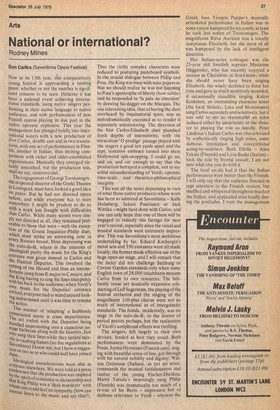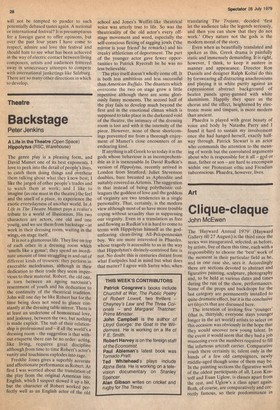Arts
National or international?
Rodney MIInes
Don Carlos (Sevonlinna Opera Festival) Now in its 13th year, this comparatively young festival is approaching a turning point; whether or not the number is significant remains to be seen. Hitherto it has been a national event achieving international standards, using native singers performing in their native language to native audiences, and with performances of new Finnish operas playing its due part in the native operatic explosion. This year the management has plunged boldly into international waters with a new production of Don Carlos, double cast and in two translations, with one set of performances in Finnish, another in Italian, thus inviting com parisons with richer and older-established organizations. Musically they emerged virtually unscathed, but the production was, Shall we say, controversial. The engagement of Georgi Tovstonogov, the respected director of the Gorki Theatre in Leningrad, must have looked a good idea Oil paper. But he had not directed opera before, and while everyone has to start somewhere it might be prudent to do so with a work less fraught with difficulties than Carlos. While many scenes were simply not directed at all, they remained preferable to those that were — with the exception of the Grand Inquisitor-Philip duet, which must strike an answering note in every Russian breast. Most depressing was the auto-da-fe, where in the interests of ideological purity the music for the King's entrance was given instead to Carlos and thC Flemish Deputies. This involved the cutting of the Herald and thus an uncomfortable jump from E major to C major, and the King having to sing his lines sheepishly with his back to the audience; when Verdi's OWn music for the Deputies entrance everyone had to stand around look ing embarrassed until it was time to resume the action. This manner of 'adapting' a faultlessly _constructed scene is crass impertinence. ! he act ended with the Deputies being sbtundled unprotesting into a capacious on age barbecue along with the heretics. Just Who sang their lines while they sizzled merr2ly S in vaulting flames (no fire regulations at t i aovonlinna) I know not, but I have a suggesn themor two as to who could well have joined , de°logical considerations were also in ev ild elsewhere. We were told at a press confeenrecnece bY t that the production was inspired he s • ' that K. pint of resistance to dictatorship and w ing Philip was a 'desk murderer' with anhom one could feel no sympathy (how can yone listen to the music and say that?). Thus the richly complex characters were reduced to posturing pasteboard symbols.
In the crucial dialogue between Philip and Posa, the King was busy with state papers so that we should realize he was not listening to Pose's apostrophe of liberty (how subtle) and he responded to `la paix du cimetiere by drawing his dagger on the Marquis. The one interesting idea, that of having the duet overheard by inquisatorial spies, was so melodramatically executed as to render it supremely uninteresting. The direction of the first Carlos-Elisabeth duet plumbed fresh depths of insensitivity, with the miraculous 0 prodige' passage played with the singers a good ten yards apart and the rapt, tentative embrace turned into mere Hollywood spit-swopping. I could go on, and on, and on: enough to say that the production betrayed a coMplete, not to say wilful misunderstanding of Verdi, operatic time-scale, and theatrico-philosophical integrity.
This was all the more depressing in view of what those native producers whose work has been so admired at Savonlinna — Kalle Holmberg, Sakari Puurunen or Jack Wittika — might have done with Carlos, and one can only hope that one of them will be engaged to remedy this farrago for next year's revival, especially since the visual and musical standards were extremely impressive. This was Savonlinna's most ambitious undertaking by far. Eduard Kochergin's metal sets and 350 costumes were all made locally; the former made effective use of the huge open-air stage, and I will remark that the latter did not challenge Salzburg or Covent Garden standards only when some English town of 28,000 inhabitants mounts Carlos from its own resources. The brilliantly tense yet musically expansive coltducting of Leif Segerstam, the playing of the festival orchestra and the singing of the magnificent 100-plus chorus were not so much of international as of intergalactic standards. The banda, incidentally, was on stage in the auto-da-fe, to the horror of period purists perhaps, but the realization of Verdi's antiphonal effects was thrilling.
The singers, left largely to their own devices, fended as best they could. Both performances were dominated by the Poses. Jorma Hynninen (Finnish cast), singing with beautiful sense of line, got through with his natural nobility and dignity; Wal ton Gronroos (Italian), as yet no actor, commands the musical fastidiousness and timbre of the young Fischer-Dieskau. Martti Talvela's imposingly sung Philip (Finnish) was dramatically too much of a re-run of his Boris — impressive but of dubious relevance to Verdi — whereas the Greek bass Yiorgos Pappas's musically articulated performance in Italian was to some extent hampered by his youth; at least he took less notice of Tovstonogov. The magnificent Ritva Auvinen was a vocally sumptuous Elisabeth, but she most of all was hampered by the lack of intelligent direction.
Her Italian-series colleague was the 23-year old Swedish soprano Marianne Haggander, who has recently enjoyed a success as Cherubino in Stockholm; while she should never have been singing Elisabeth, she wisely declined to force her tone and gave us much sensitively moulded, if occasionally inaudible singing. Kalevi Koskinen, an outstanding character tenor (the local Shuisky, Laca and Monostatos) sang Carlos accurately and sensitively, but it . was odd to see so resoureefUl an actor reduced either by uncertainty or the director to playing the role so timidly. Peter Lindroos's Italian Carlos was characterized by authentically ringing high notes, some dubious intonation and conventional acting-by-numbers. Both Ebolis — A ino Tzikala (Finnish) and Livia Budai (Italian) — took the role by frontal assault; I am not' sure what else you do with it.
The local on-dit had it that the Italian performances were better than the Finnish. I will only say that the audience listened in rapt attention to the Finnish version, hut shuffled and whispered throughout much of the Italian, and applauded arias loudly during the postludes. I trust the management will not be tempted to pander to such potentially debased tastes again. A national or international festival? It is presumptuous for a foreign guest to offer opinions, but over the past four years I have come to respect, admire and love this festival and should hate to see what has been achieved in the way of electric contact between living composers, artists and audiences frittered away in unnecessary attempts to compete with international junketings like Salzburg. There are so many other directions in which to develop.







































 Previous page
Previous page